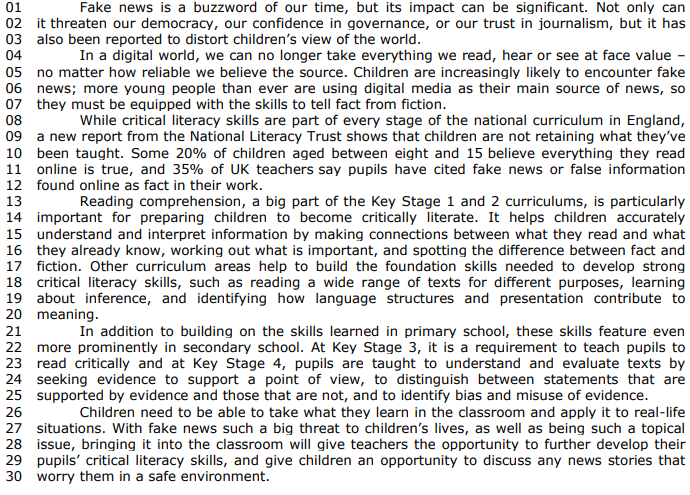Questões de Concurso
Foram encontradas 1.598 questões
Resolva questões gratuitamente!
Junte-se a mais de 4 milhões de concurseiros!
A compreensão da língua inglesa depende muito do vocabulário, se este for limitado, a comunicação também será. Seguem expressões bem interessante para facilitar essa comunicação.
Associe a segunda coluna de acordo com a primeira e encontre a resposta CORRETA:
I - To talk or to work at cross-purposes.
II - To be on the same wavelength.
III - To make head or tail of something.
IV -To hear on the grapevine.
V -To get the wrong end of the stick.
( ) Defender pontos de vista divergentes.
( ) Ter o mesmo entendimento, estar em acordo, ter sintonia.
( ) Entender alguém ou algo.
( ) Ter notícias de alguém que ouviu notícias de outra pessoa, ouvir dizer.
( ) Fazer uma leitura errada de uma situação,
interpretar errado.
Text I
While viruses do not respect borders, their spread and their chances of survival have long depended greatly on the laws, policies and acts of states. However, not all states are up to the job, writes Adam Roberts.
A.J.P. Taylor often observed that great events can have very small causes. The 2020 COVID-19 pandemic is fresh evidence for this proposition. The cause is in all likelihood tiny and accidental: a genetic mutation in a virus, which then spreads into the human population. Like earlier epidemics throughout history, it could have happened with no human intentionality. Its consequences are already momentous and will be even more so before it is over.
The novel coronavirus can easily be seen as a profoundly anti-democratic force. In its first eight months, from early January to mid-August, it produced over 20 million cases of the COVID-19 disease. That disease has killed over 800,000 people and counting; put millions out of work; drastically curtailed travel; precipitated states of emergency; and caused citizens to be placed under detailed and intrusive administrative control, demonstrations to be banned, and elections to be rescheduled or postponed. Bitter disagreements have arisen about when and how to ease restrictions on movement. COVID-19 has generated a revival of conspiracy theories and unjustified recriminations, and prompted absurd denials of medical reality by certain political leaders. Among states, the pandemic has actually heightened some long-existing disputes, most notably those on trade and other matters between China and the United States. The capacity of the United Nations system to address epidemics has been called into question, not least in harsh American criticisms of the World Health Organization (WHO).
It is too simple to cast the pandemic crisis merely as a narrative of rampant authoritarianism versus embattled democracy. The long history of pandemics, earthquakes and other disasters reminds us of the enduring complexity of disaster management, and of the many controversies surrounding it, including the causes of and responses to plagues. States respond in different ways, raising questions regarding the relative effectiveness of democratic versus authoritarian states. International health organisations, especially the WHO, have important roles in dealing with epidemics, whether regional or global. Yet their formal powers are limited and their effectiveness depends on state cooperation. Epidemics, and action to control them, do sometimes play a part in increased authoritarianism, but they can also give rise to more positive initiatives of various kinds.
Adapted from: https://www.iiss.org/. Accessed on March 20, 2021.
Instruction: Answer question based on the following text.
Fake news: improved critical literacy skills are key to telling fact from fiction

Adapted from https://www.theguardian.com/teacher-network/2017/oct/17/fake-news-improved-criticalliteracy-skills-teaching-young-people
Some words in English sound the same when they are spoken, but have different spellings and different meanings.
Which alternative contains the correct sequence to complete the sentences?
1st - Do you think it is going to (rein, rain, reign) tomorrow?
2nd - We saw a restaurant just off the (rode, road) about a mile back.
3rd - They don’t want to talk about the (passed, past) anymore.
4th - My mother (sent, scent, cent) a letter to my aunt who lives in London.
5th
- (He’ll, Heel, Heal) be here in a few minutes.